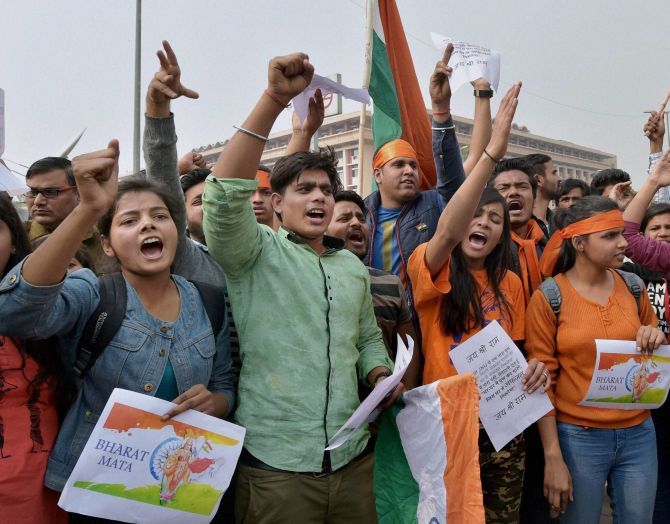
'The emphasis is on nationalism, which the party apparently feels will have greater resonance than one on religious identity which may have lost some of its appeal in recent years,' says Amulya Ganguli.
Just as the Bharatiya Janata Party today characterises its critics as anti-nationals, Indira Gandhi in the period before declaring the Emergency (1975 to 1977) used to ascribe all her difficulties to the ubiquitous 'foreign hand', which was known to hint at the Americans.
It was at that time that an MP of the pro-private sector Swatantra Party, Piloo Mody, entered Parliament with a placard saying 'I am a CIA agent' hung round his neck. When the Speaker asked him to remove it, he did so, saying, 'I am no longer a CIA agent.'
One doesn't know what the 'anti-nationals' of today will have to do to erase their stigma. Perhaps joining the BJP via a missed call on their mobiles or, where students are concerned, applying to the Akhil Bharatiya Vidhyarti Parishad for membership is a way out.
But it is obvious that just as Indira Gandhi tried to exploit what she considered was the latent anti-Americanism in the Indian mind -- Sonia Gandhi apparently expressed the same view when opposing the India-US nuclear deal -- the BJP wants to play the patriotism card to serve its political purpose at a time when it is losing its sheen of 2014.
Since xenophobia has been a feature of the Sangh Parivar's weltanschuung (wold view) since the establishment of the Rashtriya Swayamsevak Sangh nine decades ago, there is nothing surprising about the BJP's latest ploy. Its nationalist card takes different forms at different times.
In the 1990s, it was associated with Hindu pride and demonisation of the Muslims. Even now, this outlook occasionally surfaces as when the maverick Subramanian Swamy called upon Muslims to hand over the two mosques at Kashi and Mathura -- the one at Ayodhya having already been demolished -- to the Hindus and keep the remaining 39,997 mosques for themselves.
At the moment, however, the BJP has kept the Hindu factor in the background and decided to divide the country between nationalists (presumably including those minorities who belong to this category despite being Muslims like A P J Abdul Kalam) and anti-nationalists.
The slogan at the moment is not 'garv se kaho hum Hindu hain' (With pride say we are Hindus), which used to be chanted in the days of the Ram Janambhoomi movement. Instead, the emphasis is on nationalism, which the party apparently feels will have greater resonance than one on religious identity which may have lost some of its appeal in recent years.
In any event, since the BJP's version of nationalism is pitted against the pro-Pakistani anti-nationalists, who observed the death anniversary of the terrorist, Afzal Guru, in New Delhi's Jawaharlal Nehru University and mourned the death of another terrorist, Yakub Memon, earlier at the Hyderabad central university, the anti-Muslim angle is there anyway.
The present division between nationalists and anti-nationalists recalls Union Minister Sadhvi Niranjan Jyoti's categorisation of Indians between Ramzadon and haramzadon with the former representing the BJP's supporters and the derogatory term the rest of the population.
This is not the first time that such a neat cleavage has been witnessed in politics. A similar break-up between the bourgeoisie and the proletariat used to be the staple of Communism, as also the one between believers and infidels in the Islamic world.
The advantage of such schisms is that they provide an easy rallying cry for the faithful. The prerequisite of such tactics, however, is authoritarianism. They do not work in a democracy.
The BJP's difficulty, therefore, is that even if it can whip up deep anger among patriotic lawyers, as in the Patiala court, for instance, when Kanhaiya Kumar of the JNU was being presented, or make a party MLA declare that anyone saying 'Pakistan zindabad' should be killed, it is not easy to sustain the tension for long.
The reason is that FIRs will be filed against the perpetrators of even nationalist violence and explanations sought on television channels to questions such as who gave the BJP the right to be the judge of what is nationalism and what is not, as Bihar Chief Minister Nitish Kumar has asked.
In addition, there will be queries about the paradox of the BJP targeting those students who are unhappy about Afzal Guru's hanging while negotiating for a share in governance with the Peoples Democratic Front in Kashmir which also believes that Afzal Guru's death was a miscarriage of justice.
Since all of this is unavoidable in a democracy, they can make a mockery of any signs of pretentiousness or falsehood, as in the case of Indira Gandhi's foreign hand, which became a joke after some time.
The scene has been made worse for the BJP by Union Home Minister Rajnath Singh's eagerness to rope in the 26/11 mastermind, Muhamed Saeed, as a patron of the JNU anti-nationalists. Like Indira Gandhi's fabled foreign hand, the role of this one, too, will be difficult to prove.
Amulya Ganguli is a commentator on current affairs.










